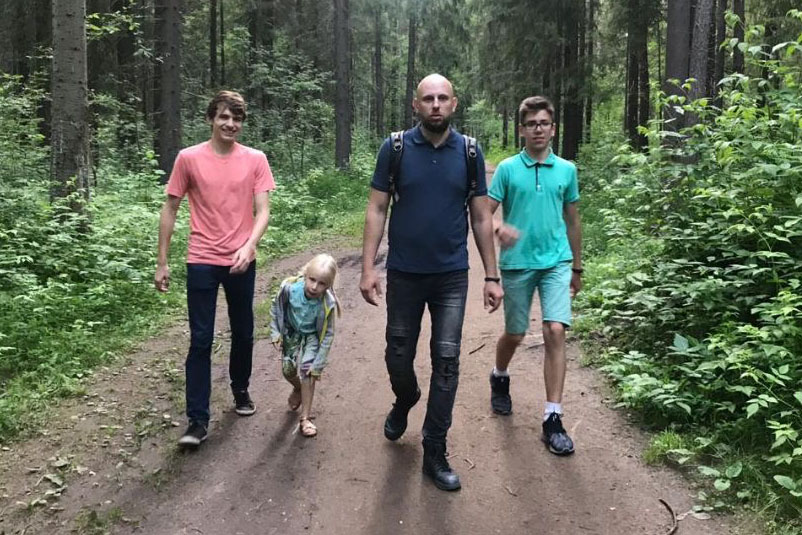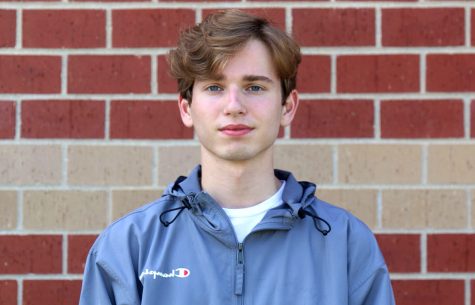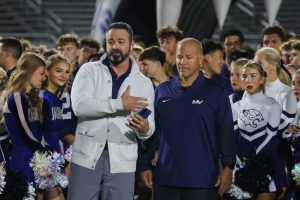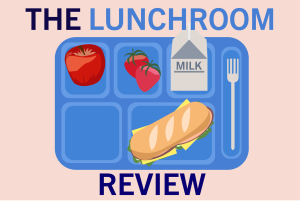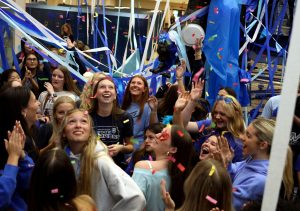Senior travels to Russia over summer to learn language
Isaac McElwee used a State Department program to live in Kirov, Russia for six weeks
By Hayden Resch
Senior Issac Mcelwee (left) walking down a trail with his Russian host family.
November 23, 2019
Reminiscing on his past trip to Spain to study Spanish, senior Isaac McElwee intensively searched online for another free or affordable summer language program. He stumbled across the National Security Language Initiative for Youth (NSLI-Y), a U.S. Department of State program for eligible high school students to learn less commonly taught languages in summer and participate in academic year-long overseas immersion programs. NSLI-Y is a very selective program with a 19.9% acceptance rate. McElwee was accepted into the program as one of 600 U.S teens annually admitted to the program.
NSLI-Y really stood out to Isaac since the program allowed him to learn more about languages and cultures with no out-of-pocket cost. The program offers merit-based scholarships for high school students, which covered the cost of all aspects of his trip to Russia except costs associated with obtaining a valid U.S. passport or required medical examinations and immunizations.
“Without this program and the funding they receive from the government, I likely never would have gotten the chance to participate in a program such as this one,” McElwee said. “I wouldn’t have been able to go to Russia simply due to a lack of money and connections to be able to obtain my visa.”
For acceptance into the NSLI-Y program, students have to be between the ages of 15 and 18 and pass a selective application process. The application asks for items such as applicants’ high school transcripts, multiple essays, a teacher recommendation and other personal information.
NSLI-Y offers a short-term six to eight week program and a summer and long-term eight to 10 month academic year program. McElwee did the summer program in Kirov, which lasted approximately six weeks.
Summer NSLI-Y programs are very well structured with participants attending a language class for three to four hours a day, conversing with language partners, participating in cultural activities and community service, and spending time in the evenings and on the weekends with their host families. In total, students are required to receive at least 120 hours of classroom language instruction during the program.
McElwee was no exception to this rigorous and structured program, speaking the language even when not attending class.
Isaac’s mother Monique McElwee had some concerns before allowing him to participate in a NSLI-Y Russian language program. Monique was nervous because of the heightened tensions between Russia and the United States in recent months. She took comfort in knowing that the program was sponsored by the U.S State Department and that the NSLI-Y representatives took the safety of the students seriously. She also took comfort in knowing that the students were briefed on safety issues and how to handle themselves in certain situations at the beginning of and throughout the program, and the students were supervised and accompanied by NSLI-Y representatives through much of the program.
“Yes, I was nervous. There are political tensions between Russia and the U.S., of course, and during Isaac’s application process and summer abroad, this was heightened in the public’s eye. I didn’t know what to expect exactly,” Monique said. “I took comfort in knowing the program itself is sponsored by the U.S. State Department, and that it was clear that NSLI-Y representatives took the safety of the students very seriously.”
“During my NSLI-Y program, I would attend language classes for anywhere from five to nine hours a day, however I was immersed in the language 24/7 due to the fact that I was living in Russia,” McElwee said.
Participants accepted into the NSLI-Y program are not required to have any background knowledge of the language they’re wanting to immerse themselves in. The program offers beginner, intermediate or advanced levels for students. McElwee had no prior knowledge of the Russian language before applying for this program and was admitted into beginner level classes with other Americans.
While in Russia for the first three weeks, McElwee stayed in a dorm with other American teenagers in the NSLI-Y program and stayed with a host family toward the end of his program.
“During my last three weeks in Kirov, I stayed with a Russian host family,” McElwee said. “I lived in their house and they treated me like another member of their family during my stay with them.”
McElwee and other teenagers participate in cultural activities as a group almost every day.
“The cultural activity would always vary depending on the day,” McElwee said. “As a group we would: learn Russian folk songs, visit nearby towns, participate in local celebrations or simply join our host families to go ice skating or to go see a movie.”
Admitted NSLI-Y applicants with significant prior knowledge of the language they’re studying will take a language test at the beginning of their program to decide which level to place them in. Accepted applicants also have to take a language test at the end of their program before travelling to their host country to measure their level of fluency. McElwee took two tests while in Russia. The first was administered by his Russian teachers during the program and tested grammar, writing, reading, listening and speaking. The second test was called the OPI (oral proficiency interview), which McElwee took once he returned to America. This test was an approximately 30 minute interview done over the phone which gauged his level of proficiency.
“At the end of my program I took [two] tests to measure my level of fluency in Russian,” McElwee said. “I believe my grades for both of these tests represented my knowledge of the Russian language fairly accurately.”
After taking the tests applicants may be considered “in good standing” which means that they took the OPI, completed the pre-program and follow-up E-Goals surveys in a timely fashion and exhibited good behavior and a positive attitude while participating in the program and, if grades are given while overseas, they must show evidence of your commitment to language learning. Only NSLI-Y participants who are considered to be “in good standing” will be considered for other NSLI-Y programs.
After finishing his program McElwee was rated “in good standing” and is able to apply and participate in another NSLI-Y program. After completing the program in Russia, he decided he wanted to apply for another program which he decided would be to learn Korean.
He submitted his application for the Korean academic year program which will last eight to 10 months. If admitted, McElwee will live in Seoul, South Korea and he will attend Korean language classes throughout the academic year while also taking other academic coursework in Korean at local high schools.
“While I cannot guarantee my admission, I have recently submitted my application to NSLI-Y for their Korean academic year program. If I am accepted then I will live in Seoul, South Korea for an academic year to study Korean,” McElwee said. “I chose Korean because I want to experience something different from anything that I previously have. I have been to Western and Eastern Europe, and now I want to experience something far outside of those cultures.”
McElwee’s biggest takeaway from completing this program is how closely related people of different cultures are. Despite the tense political climate between Russia and the United States McElwee was treated compassionately by his Russian host family.
“My biggest takeaway from completing this program is how similar everyone is and how we shouldn’t let politics and our governments define us,” McElwee said. “America and Russia, in most recent history, have had a very tense relationship politically, yet when I arrived to my host family’s house I was treated with nothing but love and care.”
After completing his summer program in Russia, McElwee recommends that other high schoolers willing to challenge themselves and broaden their understanding of culture and language should apply for an NSLI-Y program.
“I would definitely recommend NSLI-Y to braver students who are interested in learning about another country’s culture and language,” McElwee said. “The program is free, so if you think you might enjoy or benefit from it, then it can’t hurt to apply.”
To allow communication between parents and student, the NSLI-Y program provided each student with an additional phone aside from their personal cell phone for use in case of an emergency. The safety guaranteed by the program as well as the cell phone calmed Monique’s concerns.
When allowing Isaac to apply for this program, Monique not only wanted him to have an enjoyable experience but she also stressed to him the importance of trying his best to learn the language and keep up with the rigorous program.
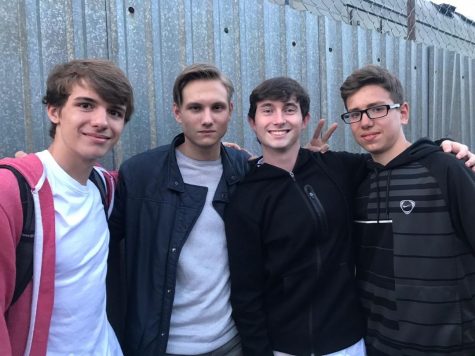
“I encouraged [Issac] to treat this [program] like a job because the government invested in him to learn the language and learn about the culture, Monique said. “The State Department chose him out of a large pool of applicants and trusted him to do good work — I wanted him to take his role seriously, which he did.”
After Isaac completed the program, Monique was very pleased with his progress since Russian is a difficult language to learn for English speakers. Isaac has kept up with the requirements and engaged with the language as much as possible and had been in contact with his Russian host family.
Monique recalled a time when Isaac and her were at the mall and they ran into a Russian family which Isaac was able to communicate with and understand. She said that the family was so impressed with his language capabilities that they had assumed that he had lived in Russia for years.
Having completed the program and being back in the states, Monique hopes that Isaac is able to maintain his ability to speak and understand Russian, since unlike Spanish there are not as many Russian speakers in America.
“I hope he is able to keep up with his Russian, as he doesn’t have as many opportunities to practice as with Spanish,” Monique said.
Overall, Monique is thrilled with the NSLI-Y program and recommends that parents who have high schoolers interested in language or studying abroad apply to this program. She also believes that the program will not only give high schoolers an interesting college application, but will also enrich them with good study habits and skills, community involvement, and relationship building skills.
“[NSLI-Y] will give perspective to your child’s worldview, and will set your child apart on college applications,” Monique said. “The program will help your younger high-school-aged students to reach goals that will aid in applying to colleges even when that still seems far away. For example, NSLI-Y has a minimum GPA requirement, which encourages good study habits and skills. NSLI-Y requires a teacher’s recommendation, which encourages relationship-building with teachers.”


